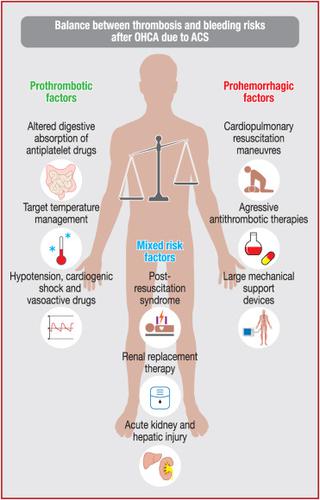Archives of Cardiovascular Diseases ( IF 2.3 ) Pub Date : 2021-09-23 , DOI: 10.1016/j.acvd.2021.07.002 Emmanuel Gall 1 , Alexandre Lafont 2 , Olivier Varenne 2 , Florence Dumas 3 , Alain Cariou 4 , Fabien Picard 5

|
Balance between thrombosis and bleeding is now well recognized in patients treated for acute coronary syndrome, with impact on short- and long-term prognosis, including survival. Recent data suggest that patients who are resuscitated after out-of-hospital cardiac arrest related to myocardial infarction are at an even higher risk of bleeding and thrombosis than those with uncomplicated acute coronary syndrome. Delayed enteral absorption of medication due to induced hypothermia and systemic inflammation increases thrombosis risk, whereas transfemoral access site, cardiopulmonary resuscitation manoeuvres and mechanical circulatory support devices increase bleeding risk. In addition, post-resuscitation syndrome and renal or hepatic impairment are potential risk factors for both bleeding and thrombotic complications. There are currently no randomized controlled trials comparing various P2Y12 inhibitor and/or anticoagulation strategies in the setting of out-of-hospital cardiac arrest, and current practice is largely derived from management of patients with uncomplicated acute coronary syndrome. The aim of this review is therefore to describe the bleeding and thrombosis risk factors in this specific population, and to review recent data on antithrombotic drugs in this patient subset.
中文翻译:

急性冠脉综合征相关院外心脏骤停后血栓形成和出血的平衡:文献综述
现在,在接受急性冠状动脉综合征治疗的患者中,血栓形成和出血之间的平衡已得到公认,这会影响短期和长期预后,包括生存。最近的数据表明,在与心肌梗塞相关的院外心脏骤停后复苏的患者比无并发症的急性冠状动脉综合征患者有更高的出血和血栓形成风险。由于诱发的体温过低和全身性炎症而延迟肠内吸收药物会增加血栓形成的风险,而经股静脉通路、心肺复苏操作和机械循环支持装置会增加出血风险。此外,复苏后综合征和肾或肝损伤是出血和血栓并发症的潜在危险因素。2 Y 12抑制剂和/或抗凝策略在院外心脏骤停的情况下,目前的实践主要来自于对无并发症的急性冠状动脉综合征患者的管理。因此,本综述的目的是描述该特定人群的出血和血栓形成危险因素,并回顾该患者亚群中抗血栓药物的最新数据。









































 京公网安备 11010802027423号
京公网安备 11010802027423号